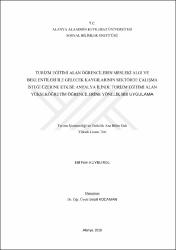| dc.contributor.advisor | Kocaman, Serpil | |
| dc.contributor.author | Rol, Elif Pelin Kuybu | |
| dc.date.accessioned | 2021-02-19T20:59:13Z | |
| dc.date.available | 2021-02-19T20:59:13Z | |
| dc.date.issued | 2019 | |
| dc.identifier.uri | https://tez.yok.gov.tr/UlusalTezMerkezi/TezGoster?key=Eb5EkakJlp3olBdo_wNEGUuKIjg2UhvN8wUD5xCGWIV8aCgzQYWHDH05eE2LrvVX | |
| dc.identifier.uri | https://hdl.handle.net/20.500.12868/218 | |
| dc.description | YÖK Tez No: 622446 | en_US |
| dc.description.abstract | Turizm, her yıl artan turist sayıları ve turizm gelirleri sebebiyle birçok ülke için vazgeçilmez bir endüstri haline gelmiştir. Doğası gereği turizm olgusunun merkezinde insan unsuru vardır. Küreselleşmenin bir sonucu olarak rekabet ortamının giderek yoğunlaştığı günümüzde, başarıda en önemli faktörün insan kaynağı olduğu açıktır. Diğer tüm alanlarda olduğu gibi, emek-yoğun bir endüstri olan turizm endüstrisi için bu durum daha da önem kazanmaktadır. Bu nedenle, turizm eğitimi almış insanların istihdam edildiği işletmeler, rakiplerinden bir adım ilerde olabilme adına önemli bir avantaja sahiptirler. Turizm eğitimi alan öğrencilerin mezun olduktan sonra sektörde çalışmalarının sağlanması turizm işletmeleri için oldukça önemlidir. Bu araştırmada turizm eğitimi alan öğrencilerin sektörde çalışma isteklerini etkileyen faktörlerden olan, mesleki algı ve beklenti ile gelecek kaygısı konuları ele alınmıştır. Çalışmanın temel amacı, öğrencilerin mesleki algı ve beklentileri ile gelecek kaygılarının turizm sektöründe çalışma istekleri üzerindeki etkilerini ve gelecekteki kaygı değişkeninin diğer iki değişken arasında aracı bir değişken olup olmadığını incelemektir. Bu amaç doğrultusunda kolayda örnekleme yoluyla belirlenen 364 turizm bölümü öğrencisine yüz yüze anket uygulanmıştır. Elde edilen veriler SPSS 22.00 programına girilerek betimsel istatistikler ve değişkenler arasındaki ilişkiler incelenmiştir. Analiz sonuçlarına göre, mesleki algı ve beklenti ile çalışma isteği arasında pozitif bir ilişki, gelecek kaygısı ile çalışma isteği arasında negatif bir ilişki ve mesleki algı ve beklenti ile gelecekte kaygısı arasında negatif bir ilişki olduğu tespit edilmiştir. Gelecek kaygısı değişkeninin, mesleki algı ve beklenti ile öğrencilerin çalışma isteği arasında kısmi bir aracı değişken olduğu ortaya çıkmıştır. | en_US |
| dc.description.abstract | Tourism has become an indispensable industry for many countries due to the increasing number of tourists and tourism revenues. As a course of its nature, there is human factor at the center of the tourism phenomenon. In today's increasingly competitive environment, as a result of globalization, it is clear that the most important factor in success is human resources. As in all other sektors, this is becoming more important for the tourism industry as a labor-intensive industry. For this reason, enterprises which are employing people with tourism education, have a significant advantage to be one step ahead of their competitors. It is very important for tourism enterprises that the students who received tourism education work in the sector after graduation. In this research, professional perceptions and expectations and future anxiety, which are among the factors affecting the desire of the students who received tourism education to work in the sector, have been discussed. The main purpose of the study is to examine the effects of students' professional perceptions and expectations and future anxieties on their desire to work in tourism sector and whether the future anxiety variable is a mediating variable between the other two variables. For this purpose, face to face surveys were applied to 364 tourism department students who were determined by easy sampling. The data obtained were entered into SPSS 22.00 program and descriptive statistics and relationships between variables were examined. According to the results of the analysis, there was a positive relationship between professional perception and expectation and desire to work, a negative relationship between future anxiety and desire to work, and a negative relationship between professional perception and expectation and future anxiety. It was revealed that the future anxiety variable was a partial mediator variable between professional perception and expectation and students' desire to work. | en_US |
| dc.language.iso | tur | en_US |
| dc.publisher | Alanya Alaaddin Keykubat Üniversitesi | en_US |
| dc.rights | info:eu-repo/semantics/openAccess | en_US |
| dc.subject | Eğitim ve Öğretim | en_US |
| dc.subject | Education and Training | en_US |
| dc.subject | Turizm | en_US |
| dc.subject | Tourism | en_US |
| dc.subject | Mesleki Algı ve Beklenti | en_US |
| dc.subject | Gelecek Kaygısı | en_US |
| dc.subject | Çalışma İsteği | en_US |
| dc.subject | Aracı Değişken | en_US |
| dc.subject | Turizm Eğitimi | en_US |
| dc.subject | Professional Perception and Expectation | en_US |
| dc.subject | Future Anxiety | en_US |
| dc.subject | Desire to Work | en_US |
| dc.subject | Partial Mediator Variable | en_US |
| dc.subject | Tourism Education | en_US |
| dc.title | Turizm eğitimi alan öğrencilerin mesleki algı ve beklentileri ile gelecek kaygılarının sektörde çalışma isteği üzerine etkisi: Antalya ilinde turizm eğitimi alan yükseköğretim öğrencilerine yönelik bir uygulama | en_US |
| dc.title.alternative | The effect of tourism students professional perceptions and expectations and future anxieties on their desire to work in the sector: An application for tourism higher education students in Antalya | en_US |
| dc.type | masterThesis | en_US |
| dc.contributor.department | ALKÜ, Sosyal Bilimler Enstitüsü, Turizm İşletmeciliği ve Otelcilik Ana Bilim Dalı | en_US |
| dc.contributor.institutionauthor | Rol, Elif Pelin Kuybu | |
| dc.identifier.startpage | 1 | en_US |
| dc.identifier.endpage | 93 | en_US |
| dc.relation.publicationcategory | Tez | en_US |


















